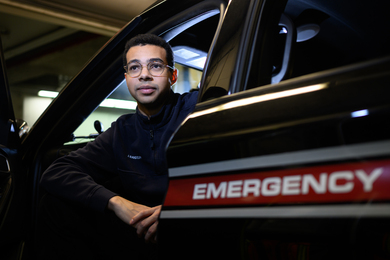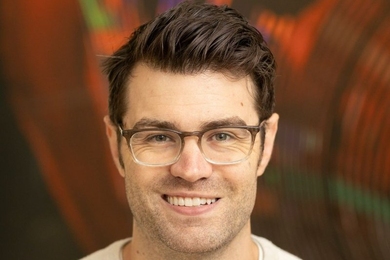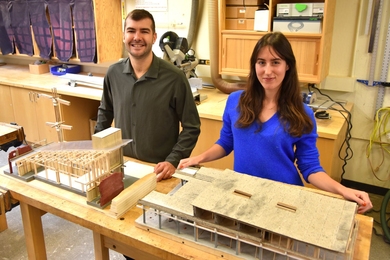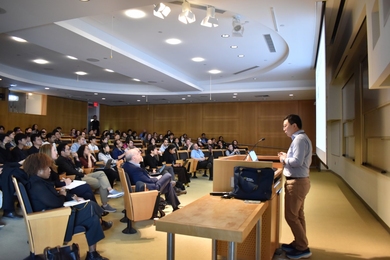On Feb 1-2, over 200 students and faculty gathered in MIT’s Building 10 to discuss and share recent advances in education technology. This first-ever — and first of its kind — “Festival of Learning” was co-sponsored by the MIT Office of Digital Learning (ODL), the Teaching and Learning Lab, and the offices of the deans of undergraduate and graduate education.
In her welcoming remarks, MIT Chancellor Cynthia Barnhart called the festival an important gathering of scholars and researchers working to reimagine the way we educate 21st century students — from digital content creation, to flipped or blended classrooms, to cracking the learning sciences code. “Clearly, the MIT community is energized about the transformations and experiments happening in this space,” Barnhart said.
The event included teaching workshops, presentations by MIT professors, poster sessions, and demonstrations. It also featured a hackathon that brought undergraduate and graduate students together to solve real-world challenges in digital education.
Satya Nitta, global head and program director of cognitive science and education technology at IBM Research, opened the festival with a presentation about the Watson cognitive computing platform and its potential to power interactive, natural language tutors for students of all ages. Later that day, Andrew Sutherland, the creator of Quizlet, gave a talk about the capabilities of his popular online learning tool, and what it can tell us about teaching.
“An extraordinary convergence”
One of the highlights of the festival was the Teaching @ MIT Lightning Round, a showcase for some of the most imaginative teaching strategies being used in MIT’s classrooms. In a series of lively seven-minute talks, professors Lorna Gibson, Michael Scott Cuthbert, Dennis Freeman, Peter Dourmashkin, and Emanuel Sachs presented their favorite methods for engaging students, including blended learning curricula and cutting-edge technological innovations.
Dourmashkin, senior lecturer in the Department of Physics, screened portions of a video lecture series he created using a new light board technology that was developed at MIT. In the videos, Dourmashkin speaks directly to the camera while solving complex equations on a luminescent window, as if he were writing on the air in front of him.
Sachs, professor of mechanical engineering, offered a more analogue approach to presenting basic mechanical concepts. Using a process he calls “guided discovery,” he encourages students to observe physical laws by manipulating simple physical objects, rubber bars, and beams that have been created specifically as teaching tools.
“The goal is to have the students discover the physical principle,” Sachs said. “I want them to feel as if they are the first human beings to create this piece of human knowledge.”
Cuthbert, an associate professor of music, led the entire auditorium in a group singalong to demonstrate the digital tools he uses to teach musical notation. Audience members watched as the notes they sang appeared on the projector screen overhead.
“It’s really exciting to see,” said Sanjay Sarma, vice president for open learning and head of ODL, of the ideas on display at the festival. He praised these innovations as evidence of extensive, ongoing collaboration between individual professors and experts in education technology, all of them working together to create new possibilities for instruction in every field. “What we are witnessing here,” he says, “is extraordinary convergence.”
A spirit of collaboration
This emphasis on shared knowledge and collaboration was on display across every aspect of the festival. The aptly titled Learning Expo featured a wide range of university offices and programs — including MITx, the Edgerton Center in India, and the student-run Educational Studies Program — showcasing their services and resources to festival participants. Faculty members were on hand to share posters and videos about their work, answer questions, and organize hands-on demonstrations of their teaching methods.
During the second day of the festival, MIT instructors participated in a series of microteaching workshops. Instructors and faculty took turns presenting short lessons to colleagues, who provided feedback about the strengths and weaknesses of each lesson and offered ideas on how to incorporate teaching innovations into future lesson plans.
Group problem-solving
Bridging the two days was an overnight hackathon that brought teams of students together to address real challenges in education technology. For example, one group worked on a browser add-on that creates multiple-choice, drop-down questions from the information contained on a web page. Another developed a user interface that assists students in managing online research. Each participating team received financial support to continue its work.
“This hackathon was successful in bringing together a diverse group of students and mentors so that they could take a fresh look at various ed-tech problems,” said ODL’s Anindya Roy, who helped organize the event. “In the long term, we would like to form a community of stakeholders from within and outside MIT who are interested in [these] problems. The hackathon was a step in that direction.”
Learning about learning
While the festival highlighted a wide range of different innovations and ideas in education technology, two consistent themes emerged. One is that new technologies provide a wealth of valuable user data and feedback for instructors who wish to refine their teaching methods. Second is that technology provides enormous potential for improving education delivery, as evidenced by the MIT faculty and students who are already applying new teaching methodologies across disciplines and departments.
“What I hope is that we’ll actually get a much deeper understanding of how learning really happens as a function of all these emerging tools,” said Nitta. “There’s such an opportunity to do seminal work here, to help students learn and to study how they’re learning at the same time.”
Sheryl Barnes, the ODL program manager who organized the event, says that she hopes people come away from the festival excited to continue collaborating and sharing ideas. "We were delighted to see so many MIT faculty, students and staff coming together to focus on learning innovation, and to share teaching methods and education-related projects from across the Institute,” she says. “We hope that seeing the work already taking place in classrooms around MIT inspires [festival attendees] to incorporate some of these innovations in their own teaching.”







